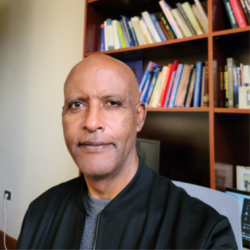
By: Dr. Menelik Desta, Executive Director of Ethiopia School Readiness Initiative
USAID CATALYZE ECCE Together for Early Childhood Evidence (CATALYZE T4ECE) is an initiative implemented by Palladium through ECD Measure at the University of Nebraska Medical Center (UNMC). CATALYZE T4ECE convenes government officials, researchers, and other stakeholders interested in pre-primary data and measurement. The consortium facilitates cross-country learning on how pre-primary systems can better use data to improve young children’s early learning experiences. CATALYZE T4ECE continues previous phases of the original T4ECE initiative launched under ECD Measure and UNMC in 2018. This blog series highlights the perspectives of ECCE research and learning stakeholders under CATALYZE T4ECE and the broader community. Learn more about CATALYZE ECCE here.
Our latest article features Dr. Menelik Desta, Executive Director of Ethiopia School Readiness Initiative and a representative on the CATALYE T4ECE Ethiopia Task Force.
Introduction
Ethiopia has been a member of Together for Early Childhood Evidence (T4ECE) since the initiative’s inception in 2018. In recent years, we have seen increased investment, commitment and attention being given to developing a data-driven early childhood care and education (ECCE) system in Ethiopia. Recently, in 2023, the revised National Policy Framework on Early Child Development and Education in Ethiopia was approved, and the Ministries of Education, Health, and Women and Social Affairs renewed their commitments to improved early childhood development and education (ECDE). All public schools across the country are now encouraged to provide pre-primary services and the new policy framework has given more space to development partners, civil society organizations and communities to bring meaningful impact to the optimal development and learning of young children.
Given the size and diversity of Ethiopia, there is a wide array of providers working and supporting ECCE, using various resources, training methodologies, and curricula. Under the previous phase of T4ECE, the Ethiopia T4ECE task force team, focusing on organizations located in Addis Ababa, developed an online repository to collect and share these resources, including early childhood research, policy, and program documentation. This Knowledge Hub has proven to be a valuable online platform for collaboration and learning for early childhood stakeholders.
Under this next phase, the CATALYZE T4ECE Ethiopia Task Force team will expand the Knowledge Hub. The research team will focus on strengthening and scaling up the existing Knowledge Hub in order to broaden its reach to organizations and resources nationwide and build the collective knowledge base of ECE throughout Ethiopia. Further, the team will work on building capacity and knowledge exchange efforts through producing syntheses of resources and policy briefs, enhancing the Knowledge Hub interface, and hosting several capacity building workshops to strengthen knowledge around early childhood data and measurement in Ethiopia.
In this blog, we interview Dr. Menelik Desta, Executive Director of Ethiopia School Readiness Initiative and a representative on the CATALYZE T4ECE Ethiopia Task Force. The project will be led by Ethiopian School Readiness Initiative, in partnership with Addis Ababa University and Educational Assessment and Examination Service (EAES).
What are you most excited about over the next year when it comes to the ECD data and measurement landscape in Ethiopia?
It is exciting to see more resources coming into the Knowledge Hub as this broadens the usability of the platform. Ultimately, we hope the Knowledge Hub facilitates communication among ECDE stakeholders globally, but particularly those interested in ECDE in Ethiopia. The Knowledge Hub is hosted at Addis Ababa University (AAU) website. This has double advantages. In Ethiopia, there are many providers of ECDE services without age-appropriate standardized milestones or age-appropriate content and in general there is a lack of communication among the multitudes of providers. The team at AAU will carefully assess and review the content of the resources to ensure that only useful materials are uploaded and accessed by providers. Secondly, the experience sharing that is created by the Knowledge Hub means the spread of efficient ways of addressing issues and the correction of unhelpful practices. The realization of this in Ethiopia is very exciting.
What are current gaps when it comes to ECD data use in Ethiopia?
To me, the most important gap in Ethiopia is extreme scarcity of appropriately trained providers, particularly educators and planners. As a result of this general shortage of appropriate knowledge and skills, we face issues related to the lack of contextualized age-appropriate ECDE guidelines, pedagogical skills, and classroom management. Other gaps include awareness among families and local authorities regarding the necessity of multisectoral involvement; poor, unsafe or unhygienic ECDE environments; insufficient resources; problematic high-class size; lack of age-appropriate play materials; poor utilities; inconsistent and unstandardized monitoring and supervision; and lack of continuous supervision and outcome evaluations.
How will the CATALYZE T4ECE-supported project help to fill in or address those gaps?
CATALYZE T4ECE will contribute significantly towards creating awareness and increasing general knowledge and access to resources. Accessed freely by any interested entity, the Knowledge Hub informs about who is doing what in Ethiopia regarding ECD. The Knowledge Hub can also be used as an access point for researchers who want to evaluate the status of the country’s policy and national implementation strategies. Moreover, the Knowledge Hub will be handy for preservice trainees who can use the resources for enriching their knowledge and skills and for accessing references for their individual projects.
The Knowledge Hub can also benefit the strained economy of Ethiopia by its contribution towards avoiding redundancy. Repeatedly, we see the same types of activities being carried out, similar resources being developed, and overlaps in supports made available to the system; the resources wasted on the redundancy could be used for other unaddressed activities.
Finally, the T4ECE-supported awareness training on outcome measurement is going to be an eye opener for most providers in Ethiopia. The training will inform stakeholders that there should be transformation of outcome measurement from assessing numeracy, literacy, and anthropometry to assessing children’s comprehensive functioning including social and mental/behavioral functions.
How do you envision this project supporting or being useful to countries beyond Ethiopia?
CATALYZE T4ECE Ethiopia is a model that can be scaled up in other African countries. The creation of a national repository of ECD related projects and resources, such as our Knowledge Hub, is useful for any country. It facilitates knowledge sharing and ease of access for interested stakeholders.
The capacity building workshops and emphasis on evidence-based decision making, and outcome measurement is also important for any project in any country working to enhance early child development and education. Without such measurement, nations cannot be certain whether projects have achieved desired outcomes. A successful investment in ECDE therefore requires, among other things, robust measurement mechanisms in place to determine outcomes.

This blog is made possible by the generous support of the American people through the Office of Education, Bureau for Africa, U.S Agency for International Development (USAID) under the terms of contract No. 7200AA19C00080, subcontract CATALYZE-Edu-CR-2023-0352. The contents of this website are developed by the ECD Measure group hosted at the University of Nebraska Medical Center and do not necessarily reflect the views of USAID or the United States Government.
